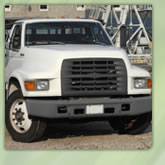 |
Case Studies
City of Milwaukee, Wisconsin Fleet Audit
2019 – 2020
The City of Milwaukee received an Energy Innovation Grant from the Wisconsin Public Service Commission’s Office of Energy Innovation for an Energy Plan study, including all City owned buildings and a full fleet audit. Clean Fuels Consulting (CFC) was selected as a specialty subcontractor of Edison Energy to perform a comprehensive assessment of the entire City fleet, which was more than three thousand vehicles.
The goals of the study were to determine how the City could lower its energy usage overall, decrease greenhouse gas emissions and utilize more renewable sources of energy. CFC was well positioned to review all departmental activities, duty cycles, vehicle staging and the replacement cycle. Milwaukee is famous not only as the Beer City, but also for its extensive natural gas refuse truck fleet, and its publicly accessible natural gas stations which are open to the community. It also makes use of biodiesel, the plant based environmentally fuel which is mixed into diesel and used by heavy duty vehicles. So it already had an extensive alternative fuel vehicle program in place. The fleet director, Jeff Tewes (now retired), sits on the board of the Wisconsin Clean Cities Coalition, and is an alternative fuel expert in his own right. He had undertaken extensive right sizing and downsizing efforts over a ten year period and incorporated many light duty hybrid cars and SUV’s. The City also has a highly skilled staff in its Environmental Collaboration Office, known as ECO, made up of sustainability professionals.
Each department’s vehicles of choice were reviewed and extensive interviews and site visits conducted. The intent of the study was to find solutions which would work within the framework of current operations, and not force feed sustainability suggestions. A collaborative effort was made to generate, vet and winnow solutions and vehicle choices that were affordable, proven and if possible available off state contract and through existing procurement channels.
Hybrid police vehicles, expansion of electric vehicles and charging equipment, use of telematics and software improvements, as well as expanded use of biodiesel blends were all final recommendations. Updating the Code of Ordnance section on vehicle acquisition could also serve to completely transform the fleet. Finally, use of location discrete solutions for charging electric vehicles was also recommended, such as solar canopies. Currently, efforts are being made to assemble cost quotes and technology applications to be ready should grant funds become available and to plan for capital improvements.
< back to Case Studies
|
 |

